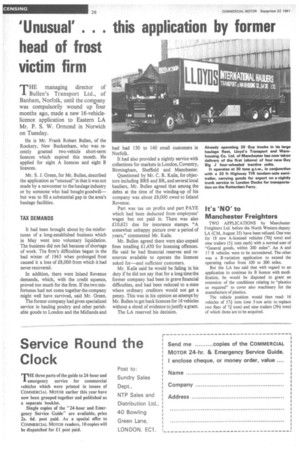'Unusual' . . . this application by former head of frost victim firm
Page 28

If you've noticed an error in this article please click here to report it so we can fix it.
rr HE managing director of
Bullen's Transport Ltd., of Banham, Norfolk, until the company was compulsorily wound up four months ago, made a new 16-vehiclelicence application to Eastern LA Mr. P. S. W. Ormond in Norwich on Tuesday.
He is Mr. Frank Robert Bullen, of the Rookery, New Buckenham, who was recently granted two-vehicle short-term licences which expired this month. He applied for eight A licences and eight B licences.
Mr. S. J. Green, for Mr. Bullen, described the application as "unusual" in that it was not made by a newcomer to the haulage industry or by someone who had bought goodwill— but was to fill a substantial gap in the area's haulage facilities.
TAX DEMANDS It had been brought about by the misfortunes of a long-established business which in May went into voluntary liquidation. The business did not fail because of shortage of work. The firm's difficulties began in the bad winter of 1963 when prolonged frost caused it a loss of £8,000 from which it had never recovered.
In addition, there were Inland Revenue demands, which, with the credit squeeze, proved too much for the firm. If the two misfortunes had not come together the company might well have survived, said Mr. Green.
The former company had given specialized service in hauling poultry and other perishable goods to London and the Midlands and had had 130 to 140 small customers in Norfolk.
It had also provided a nightly service with collections for markets in London, Coventry, Birmingham, Sheffield and Manchester.
Questioned by Mr. C. R. Kaile, for objectors including BRS and BR, and several local hauliers, Mr. Bullen agreed that among the debts at the time of the winding-up of his company was about £8,000 owed to Inland Revenue.
Part was tax on profits and part PAYE which had been deducted from employees' wages but not paid in. There was also £10,621 due for insurance stamps. "A somewhat unhappy picture over a period of years," commented Mr. Kaile.
Mr. Bullen agreed there were also unpaid fines totalling £1,450 for licensing offences. He said he had financial reserves and resources available to operate the licences asked for—and sufficient customers.
Mr. Kaile said he would be failing in his duty if he did not say that for a long time the former company had been in grave financial difficulties, and had been reduced to a state where ordinary creditors would not get a penny. This was in his opinion an attempt by Mr. Bullen to get back licences for 16 vehicles without a shred of evidence to justify a grant.
The LA reserved his decision.
Already operating 20 Guy trucks in its large haulage fleet. Lloyd's Transport and Warehousing Co. Ltd. of Manchester has now taken delivery of the first (above) of four new Guy Big J four-wheeled tractive units.
It operates at 30 tons g.t.w., in conjunction with a 33 ft Highway TIR tandem-axle semitrailer, carrying goods for export on a nightly trunk service to London Docks for transportation on the Rotterdam Ferry.
It's 'NO' to Manchester Freighters
TWO APPLICATIONS by Manchester Freighters Ltd. before the North Western deputy LA (CM, August 25) have been refused. One was for 18 new A-licensed vehicles (70+ tons) and nine trailers (5+ tons each) with a normal user of "General goods, within 200 miles". An A and 17 B vehicles were to be surrendered. The other was a B-variation application to extend the operating radius from 100 to 200 miles.
But the LA has said that with regard to an application to continue its B licence with modification, he would be disposed to grant an extension of the conditions relating to "plastics as required" to cover also machinery for the manufacture of plastics.
The vehicle position would then read: 16 vehicles of 57+. tons (one 5-ton artic to replace two flats of 7+ tons) and nine trailers (39+ tons) of which three are to be acquired.




























































































































